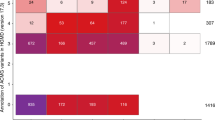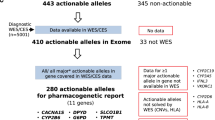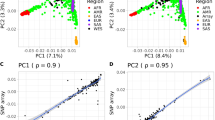Abstract
High-throughput DNA sequencing provides not only primary diagnosis but also makes available other genetic variants with potential health implications. the American College of Medical Genetics and Genomics (ACMG) has recommended a list of medically actionable genes since 2013 and very recently released an updated ACMG SF v3.0 list comprising 73 genes. Here, we analyzed exome data of 1559 unrelated Thai individuals to determine the frequency and spectrum of pathogenic (P) or likely pathogenic (LP) variants in the 73 genes. Based on the ACMG guidelines for the interpretation of sequence variants, 68 different P/LP variants in 26 genes associated with 18 diseases inherited in an autosomal-dominant manner of 186 individuals (11.9%; 186/1559) were identified. Of these, 22 P/LP variants in 15 genes associated with 13 diseases of 85 individuals (5.5%; 85/1559) were also reported as P/LP in the ClinVar archive. The majority harbored variants in genes related to cardiovascular diseases (4.7%; 74/1559), followed by cancer phenotypes (0.5%; 8/1559). None of the individuals in our cohort harbored biallelic variants in genes responsible for diseases inherited in an autosomal recessive manner. The results would serve as a basis for precision medicine practice at individual and population levels.
This is a preview of subscription content, access via your institution
Access options
Subscribe to this journal
Receive 12 print issues and online access
$259.00 per year
only $21.58 per issue
Buy this article
- Purchase on Springer Link
- Instant access to full article PDF
Prices may be subject to local taxes which are calculated during checkout


Similar content being viewed by others
References
Kamolvisit W, Phowthongkum P, Boonsimma P, Kuptanon C, Rojnueangnit K, Wattanasirichaigoon D, et al. Rapid exome sequencing as the first-tier investigation for diagnosis of acutely and severely ill children and adults in Thailand. Clin Genet. 2021;100:100–105.
Green RC, Berg JS, Grody WW, Kalia SS, Korf BR, Martin CL, et al. ACMG recommendations for reporting of incidental findings in clinical exome and genome sequencing. Genet Med 2013;15:565–74.
Kalia SS, Adelman K, Bale SJ, Chung WK, Eng C, Evans JP, et al. Recommendations for reporting of secondary findings in clinical exome and genome sequencing, 2016 update (ACMG SF v2.0): a policy statement of the American College of Medical Genetics and Genomics. Genet Med 2017;19:249–55.
Jang MA, Lee SH, Kim N, Ki CS. Frequency and spectrum of actionable pathogenic secondary findings in 196 Korean exomes. Genet Med 2015;17:1007–11.
Yu MHC, Mak CCY, Fung JLF, Lee M, Tsang MHY, Chau JFT, et al. Actionable secondary findings in 1116 Hong Kong Chinese based on exome sequencing data. J Hum Genet. 2020;66:637–641.
Jalkh N, Mehawej C, Chouery E. Actionable exomic secondary findings in 280 Lebanese participants. Front Genet 2020;11:208.
Kuo CW, Hwu WL, Chien YH, Hsu C, Hung MZ, Lin IL, et al. Frequency and spectrum of actionable pathogenic secondary findings in Taiwanese exomes. Mol Genet Genom Med 2020;8:e1455.
Tang CS, Dattani S, So MT, Cherny SS, Tam PKH, Sham PC, et al. Actionable secondary findings from whole-genome sequencing of 954 East Asians. Hum Genet 2018;137:31–7.
Jain A, Gandhi S, Koshy R, Scaria V. Incidental and clinically actionable genetic variants in 1005 whole exomes and genomes from Qatar. Mol Genet Genomics. 2018;293:919–29.
Haer-Wigman L, van der Schoot V, Feenstra I. Vulto-van Silfhout AT, Gilissen C, Brunner HG, et al. 1 in 38 individuals at risk of a dominant medically actionable disease. Eur J Hum Genet 2019;27:325–30.
Miller DT, Lee K, Chung WK, Gordon AS, Herman GE, Klein TE, et al. ACMG SF v3.0 list for reporting of secondary findings in clinical exome and genome sequencing: a policy statement of the American College of Medical Genetics and Genomics (ACMG). Genet Med. 2021;23:13891–1390.
Richards S, Aziz N, Bale S, Bick D, Das S, Gastier-Foster J, et al. Standards and guidelines for the interpretation of sequence variants: a joint consensus recommendation of the American College of Medical Genetics and Genomics and the Association for Molecular Pathology. Genet Med 2015;17:405–24.
Miller DT, Lee K, Gordon AS, Amendola LM, Adelman K, Bale SJ, et al. Recommendations for reporting of secondary findings in clinical exome and genome sequencing, 2021 update: a policy statement of the American College of Medical Genetics and Genomics (ACMG). Genet Med. 2021;23:1391–1398.
Li H, Durbin R. Fast and accurate short read alignment with Burrows-Wheeler transform. Bioinformatics 2009;25:1754–60.
McKenna A, Hanna M, Banks E, Sivachenko A, Cibulskis K, Kernytsky A, et al. The Genome Analysis Toolkit: a MapReduce framework for analyzing next-generation DNA sequencing data. Genome Res 2010;20:1297–303.
Wang K, Li M, Hakonarson H. ANNOVAR: functional annotation of genetic variants from high-throughput sequencing data. Nucleic Acids Res 2010;38:e164.
Kopanos C, Tsiolkas V, Kouris A, Chapple CE, Albarca Aguilera M, Meyer R, et al. VarSome: the human genomic variant search engine. Bioinformatics 2019;35:1978–80.
Semsarian C, Ingles J, Maron MS, Maron BJ. New perspectives on the prevalence of hypertrophic cardiomyopathy. J Am Coll Cardiol 2015;65:1249–54.
Aftab M, Cikach FS, Zhu Y, Idrees JJ, Rigelsky CM, Kalahasti V, et al. Loeys-Dietz syndrome: intermediate-term outcomes of medically and surgically managed patients. J Thorac Cardiovasc Surg 2019;157:439–50. e5
Najam O, Ray KK. Familial hypercholesterolemia: a review of the natural history, diagnosis, and management. Cardiol Ther 2015;4:25–38.
Huang CC, Charng MJ. Genetic diagnosis of familial hypercholesterolemia in Asia. Front Genet 2020;11:833.
Petrucelli N, Daly MB, Feldman GL. Hereditary breast and ovarian cancer due to mutations in BRCA1 and BRCA2. Genet Med 2010;12:245–59.
Collet C, Laplanche JL, Page J, Morel H, Woimant F, Poujois A. High genetic carrier frequency of Wilson’s disease in France: discrepancies with clinical prevalence. BMC Med Genet 2018;19:143.
Park HD, Ki CS, Lee SY, Kim JW. Carrier frequency of the R778L, A874V, and N1270S mutations in the ATP7B gene in a Korean population. Clin Genet 2009;75:405–7.
Fabisikova K, Hamidova O, Behulova RL, Zavodna K, Priscakova P, Repiska V. Case report: the role of molecular analysis of the MUTYH gene in asymptomatic individuals. Front Genet 2020;11:590486.
Acknowledgements
We would like to thank the patients and their families for participating in this study, clinicians for collecting clinical information, and bioinformaticians for analyzing and managing the database. This work was supported by Thailand Research Fund (DPG6180001), Health Systems Research Institute, TSRI Fund (CU_FRB640001_01_30_10), and the Second Century Fund (C2F), and Ratchadaphiseksomphot Endowment Fund of Chulalongkorn University (764002-HE01).
Author information
Authors and Affiliations
Contributions
W.C.: data curation, formal analysis, and writing the original draft; V.S.: conceptualization, funding acquisition, and editing the manuscript.
Corresponding author
Ethics declarations
Competing interests
The authors declare no competing interests.
Additional information
Publisher’s note Springer Nature remains neutral with regard to jurisdictional claims in published maps and institutional affiliations.
Supplementary information
Rights and permissions
About this article
Cite this article
Chetruengchai, W., Shotelersuk, V. Actionable secondary findings in the 73 ACMG-recommended genes in 1559 Thai exomes. J Hum Genet 67, 137–142 (2022). https://doi.org/10.1038/s10038-021-00982-2
Received:
Revised:
Accepted:
Published:
Issue Date:
DOI: https://doi.org/10.1038/s10038-021-00982-2
This article is cited by
-
A commentary on actionable secondary findings in the 73 ACMG-recommended genes in 1559 Thai exomes
Journal of Human Genetics (2022)



